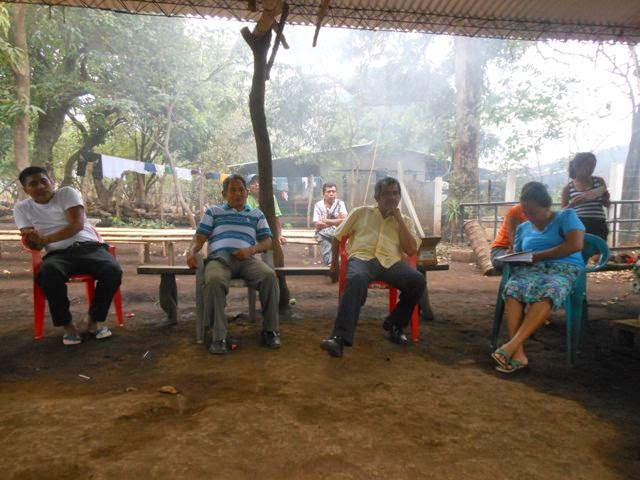Play on. Of all the old books, I have to include Shakespeare
as one of my favorites. (I’m actually shocked it took me this long to exhibit
my full nerd-dom). I’ve been thinking about music a lot lately – it has always
been a part of my life in one form or another, from when I was little and I
learned my grandmother was a world class soprano opera singer to early years
(or given the theme, my salad days)
of violin lessons with Xin Ding (Dad used to call her Shin Dig – he swore every
time it was an honest mistake, but I know better).
Despite a long history of sheet music and orchestras - even
conducting the score of Pirates of the
Caribbean in the chemistry lab when no one was looking - I never thought
music would be a large part of my life in El Salvador. The gifts I thought I
was bringing here were the practical and the methodical - mathematics,
language, science and research. I am a girl very comfortable with knowing the
rights and wrongs (you know when
you’ve screwed up your Spanish… turns out sentar
is very different from sentir - to
sit and to feel), but improvisation? Not my thing.
But Shakespeare wasn’t talking about mathematical etudes. He
was talking about music that feeds true love. And I’ve fallen in love with El
Salvador. And it’s not because I get it right all the time, or because I’m the
best at something (which, for me, was a big piece of feeling accepted at
Columbia). It’s in large part due to music. My friends, my Salvadoran family,
are tied by that one strong thread. When language fails me, or when I don’t
understand, somehow I come back to this one part of my life I had always
considered sideline stuff, a backdrop to a good college resume. Not as a
lifeline, though looking back at my YASC training, that’s exactly what it was.
During our YASC training we attended a bilingual service at
Christ Church in Tarrytown in half-English/half-Spanish. The service itself was
still pretty new to me, and my fellow YASCers were patient enough to humor my
questions: Why do you say it this way?
What does the Lord’s Prayer mean to you? Why do some churches have those wafer
things and others delicious loaves of real bread?
But then someone started to play guitar. A repetitive,
strumming rhythm that made sense to me, even the words I could place within my
own lexicon because something switches in Spanish. Yes, words are words,
translations are literal and effective, but you can’t explain the flow from one
sentence to another, or the difference between cielo and heaven. It’s
like having someone explain strawberries. You have to taste it to understand.
And I think that’s a lot of what YASC is all about.
Elizabeth Boe, Director of the YASC program, is here in El Salvador for the
IARCA Synod, a meeting of the Episcopal leaders in Latin America, from Panama
to Guatemala. During the meetings, the various Bishops presented social works
from each country, ranging from new schools to organic agriculture and capacity
building trainings. But with the heat, the language, the rapid-fire references,
and ice cream vendors enthusiastically shouting out flavors from the street
just outside, it was a meditation exercise of Mr. Myagi-like proportions to
fully understand. But at the end, there was a song. The priest from San Juan
Evangelista (the host church here in San Salvador) got up and started to play,
and it was a song I knew from that first service in Tarrytown.
When you mix the foreign with the familiar a strange thing
happens. A recognition that despite the discomfort, the unknown, the scary, the
strange… we are a lot closer than we think. It’s that something bigger than
yourself that shows up in the strangest ways, but only if you make room for it.
For me, YASC is that room, that crowbar that forces open your routines, your
preconceptions, your judgments, so that new light can shine through. For each
person it’s different. For me, it’s music. Music has come flooding in, the food
of love and passion and exploration for things, people and places I never
imagined I could relate to, let alone construct my life around. But that’s
exactly what has happened.
 |
| A long overdue dinner with Elizabeth (from the 815 office) and Rachel (YASCer in Panama) after they arrive in El Salvador for Synod. |
 |
| Our growing capoeira family here in San Salvador (the big stick is part of an instrument called a berimbau). |
 |
| All the troublemakers, together at last. Rachel, Joseph (other Panama YASCer) and I the night they arrived for Synod. |










